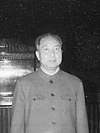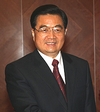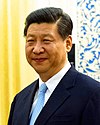The paramount leader (simplified Chinese: 党和国家最高领导人; traditional Chinese: 黨和國家最高領導人; pinyin: Dǎng hé guójiā zuìgāo lǐngdǎorén[citation needed], literally "the highest leader of the party and the state", refers to the political leader of China in modern Chinese political science.
Until the mid-1990s, the paramount leader was able to wield power without necessarily holding any official or formally significant governmental position. The most notable example is former Chinese leader Deng Xiaoping, who held supreme power in the People's Republic of China roughly from 1978 to 1992 without officially holding the top political offices. The current paramount leader is Xi Jinping. The paramount leader usually holds the following posts[citation needed]:
- General Secretary of the Communist Party of China
- The leader of the Party and the highest ranking position (simplified Chinese: 中国共产党中央委员会总书记; traditional Chinese: 中國共產黨中央委員會總書記; pinyin: Zhōngguó gòngchǎndǎng zhōngyāng wěiyuánhuì zǒngshūjì)
- Chairman of the Central Military Commission
- Commander-in-chief of the People's Liberation Army (simplified Chinese: 中央军事委员会主席; traditional Chinese: 中央軍事委員會主席; pinyin: Zhōngyāng jūnshì wěiyuánhuì zhǔxí)
- President of the People's Republic of China
- The head of state - ceremonial figurehead since 1982.[1] (simplified Chinese: 中华人民共和国主席; traditional Chinese: 中華人民共和國主席; pinyin: Zhōnghuá rénmín gònghéguó zhǔxí.
History[]
The term was commonly applied to Mao Zedong[citation needed], who at times ruled with practically absolute power, and Deng Xiaoping, who was the most influential person in the PRC despite not holding the hierarchically most powerful official positions. Following the death of Deng, the term has seldom been used since power is held more or less collectively by the members of the Politburo Standing Committee of the Communist Party of China with the General Secretary acting as a first among equals figure, and different factions jockeying for influence. Policy decisions are thought to be made via majority vote of Standing Committee members following internal discussions.[2] For example, though Jiang Zemin left the Standing Committee in 2002 and resigned all his posts in 2004, members of the Shanghai clique (of which Jiang is a member) retained a majority in the Standing Committee. Leadership transition takes several months. For instance, in the case of Xi Jinping:
- General Secretary of the Communist Party of China (November 2012)
- Chairman of the Central Military Commission (November 2012)
- President of the People's Republic of China (March 2013)
In the case of the transition to both Jiang Zemin and Hu Jintao, the Chairman of the Central Military Commission was the last office handed over by the previous paramount leader, in order to secure political influence and ensure political continuity. In the case of the Hu to Xi transition, Hu resigned the Party CMC immediately leading to the belief that he will resign the State CMC in March 2013, when his term as President ends.
List of paramount leaders[]
To date, "paramount leader" has been applied to six individual Chinese leaders (dates approximate):

- Generations of leadership
First administration Second administration Third administration Hu–Wen Administration Xi–Li Administration
| Picture | Name | Offices held | Period | Supreme rule | Ideology |
|---|---|---|---|---|---|
| File:Mao Zedong portrait.jpg | Mao Zedong 毛泽东 (1893–1976) Beijing At-large (49-76)[Clarification needed] |
Chairman of the CPC Central Politburo | 20 March 1943 – 28 September 1956 | 1 October 1949 ↓ 9 September 1976 (26 years, 344 days) |
Mao Zedong Thought |
| Chairman of the CPC Central Secretariat | |||||
| Chairman of the CPC Central Committee | 19 June 1945 – 9 September 1976 | ||||
| Chairman of the PRC Central People's Government | 1 October 1949 – 27 September 1954 | ||||
| Chairman of the National Committee | 9 October 1949 – 25 December 1954 | ||||
| Chairman of the CPC Central Military Commission | 8 September 1954 – 9 September 1976 | ||||
| Chairman of the PRC | 27 September 1954 – 27 April 1959 | ||||

|
Hua Guofeng 华国锋 (1921–2008) Hunan At-large (64–78) Beijing At-large (78–83)[Clarification needed] File:Hua Guofeng Signature.svg |
Premier of the PRC State Council | 4 February 1976 – 10 September 1980 | 9 September 1976 ↓ 22 December 1978 (2 years, 104 days) |
Two Whatevers |
| 1st Vice Chairman of the CPC Central Committee | 7 April 1976 – 7 October 1976 | ||||
| Chairman of the CPC Central Committee | 9 September 1976 – 22 December 1978 | ||||
| Chairman of the CPC Central Military Commission | 6 October 1976 – 28 June 1981 | ||||

|
Deng Xiaoping 邓小平 (1904–1997) Beijing At-large (59–64,78–83) PLA At-large (83–97)[Clarification needed] File:Deng Xiaoping Sign.png |
1st Vice Premier of the PRC State Council | 17 January 1975 – 18 June 1983 | 22 December 1978 ↓ 12 October 1992 (13 years, 295 days) |
Deng Xiaoping Theory |
| Chairman of the National Committee | 8 March 1978 – 17 June 1983 | ||||
| Chairman of the CPC Central Military Commission | 28 June 1981 – 9 November 1989 | ||||
| Chairman of the CPC Central Advisory Commission | 13 September 1982 – 2 November 1987 | ||||
| Chairman of the PRC Central Military Commission | 6 June 1983 – 19 March 1990 | ||||

|
Jiang Zemin 江泽民 (1926–) Shanghai At-large (88–08)[Clarification needed] File:Jiang Zemin Sign.png |
General Secretary of the CPC Central Committee | 24 June 1989 – 25 November 2002 | 12 October 1992 ↓ 19 September 2004 (11 years, 343 days) |
Three Represents |
| Chairman of the CPC Central Military Commission | 9 November 1989 – 19 September 2004 | ||||
| Chairman of the PRC Central Military Commission | 19 March 1990 – 13 March 2005 | ||||
| President of the PRC | 27 March 1993 – 15 March 2003 | ||||

|
Hu Jintao 胡锦涛 (1942–) Guizhou At-large (88–93,98–03) Tibet At-large (93–98,03–08) Zhejiang At-large (08–present)[Clarification needed] File:Hu Jintao Sign.svg |
General Secretary of the CPC Central Committee | 15 November 2002 – 15 November 2012 | 19 September 2004 ↓ 15 November 2012 (8 years, 57 days) |
Scientific Development Concept |
| President of the PRC | 15 March 2003 – 14 March 2013 | ||||
| Chairman of the CPC Central Military Commission | 19 September 2004 – 15 November 2012 | ||||
| Chairman of the PRC Central Military Commission | 13 March 2005 – 14 March 2013 | ||||

|
Xi Jinping 习近平 (1953–) Fujian At-large (98–03) Zhejiang At-large (03–08) Shanghai At-large (08–present)[Clarification needed] File:Xi Jinping sign.svg |
General Secretary of the CPC Central Committee | 15 November 2012 – Incumbent | 15 November 2012 ↓ Incumbent (11 years, 156 days) |
Chinese Dream |
| Chairman of the CPC Central Military Commission | |||||
| President of the PRC | 14 March 2013 – Incumbent | ||||
| Chairman of the PRC Central Military Commission |
See also[]
- List of leaders of the Communist Party of China
- Chairman of the Communist Party of China
- General Secretary of the Communist Party of China
- Chairman of the Central Military Commission
- Orders of precedence in the People's Republic of China
- List of Chinese leaders
- Supreme Leader (disambiguation)
- Maximum Leader
References[]
The original article can be found at Paramount leader and the edit history here.